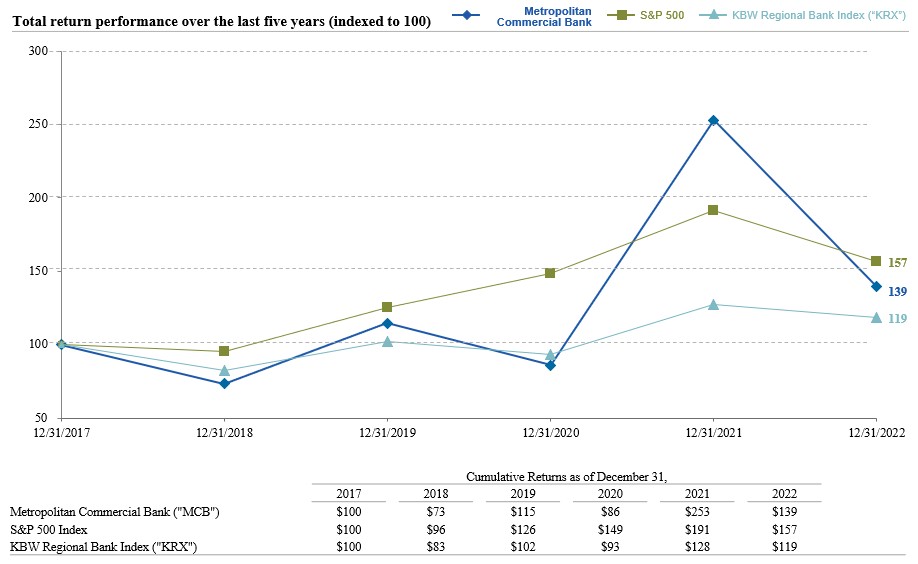cease to be published or cease to be representative after June 30, 2023. All other LIBOR settings ceased to be published or to be representative as of December 31, 2021. In the U.S., the Alternative Reference Rates Committee of the FRB and the FRBNY identified the SOFR as an alternative U.S. dollar reference interest rate.
The Company has a significant number of loans, borrowings and other financial instruments with attributes that are either directly or indirectly dependent on LIBOR. The transition from LIBOR could create considerable costs and additional risk. Since proposed alternative rates are calculated differently, payments under contracts referencing new rates may differ from those referencing LIBOR. The transition may change the Company’s market risk profiles, requiring changes to risk and pricing models, valuation tools, product design and hedging strategies. Additionally, banking regulators have stated that the failure to adequately prepare for LIBOR’s discontinuance could undermine financial stability and an institution’s safety and soundness and create litigation, operational and consumer protection risks. Furthermore, failure to adequately manage this transition process with customers could adversely impact the Company’s reputation or could have a material adverse effect on the Company’s business, financial condition and results of operations.
The Company is exposed to the risks of natural disasters and global market disruptions.
The Company handles a substantial volume of customer and other financial transactions every day. Its financial, accounting, data processing, check processing, electronic funds transfer, loan processing, online and mobile banking, automated teller machines, backup or other operating or security systems and infrastructure may fail to operate properly or become disabled or damaged as a result of a number of factors including events that are wholly or partially beyond its control, including major infrastructure outages, natural disasters or events arising from local or larger scale political or social matters, including terrorist acts, pandemics, and cyber-attacks. Operational risk exposures could adversely impact the Company’s results of operations, liquidity and financial condition, and cause reputational harm.
Additionally, global markets may be adversely affected by natural disasters, the emergence of widespread health emergencies or pandemics, cyber-attacks or campaigns, military conflict, terrorism or other geopolitical events. Global market disruptions may affect the Company’s business liquidity. Also, any sudden or prolonged market downturn in the United States or abroad, as a result of the above factors or otherwise could result in a decline in revenue and adversely affect the Company’s results of operations and financial condition, including capital and liquidity levels.
Risks Related to the Company’s Global Payments Business
Regulatory scrutiny of BaaS solutions and related technology considerations has recently increased.
We provide global payments infrastructure access to our fintech partners, which includes serving as an issuing bank for third-party managed prepaid and debit card programs nationwide and providing other financial services infrastructure, including cash settlement and custodian deposit services. Recently, federal bank regulators have increasingly focused on the risks related to bank and fintech company partnerships, raising concerns regarding risk management, oversight, internal controls, information security, change management, and information technology operational resilience. This focus is demonstrated by recent regulatory enforcement actions against other banks that have allegedly not adequately addressed these concerns while growing their BaaS offerings. Additionally, there are ongoing investigations by federal and state governmental entities concerning a prepaid debit card product program that was offered by the Company through an independent program manager. We could be subject to additional regulatory scrutiny with respect to that portion of our business that could have a material adverse effect on the business, financial condition, results of operations and growth prospects of the Company. See “Risk Factors ― The Company and the Bank’s business, financial condition, results of operations and future prospects could be adversely affected by the highly regulated environment and the laws and regulations that govern it.”
The Company faces intense competition in the global payments industry.
The global payments industry is highly competitive, continuously changing, highly innovative, and increasingly subject to regulatory scrutiny and oversight. Many areas in which the Company competes evolve rapidly with innovative and disruptive technologies, shifting user preferences and needs, price sensitivity of merchants and consumers, and frequent introductions of new products and services. Competition also may intensify as new competitors emerge, businesses enter

